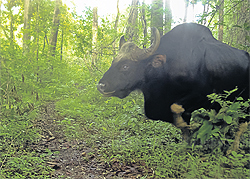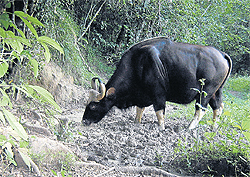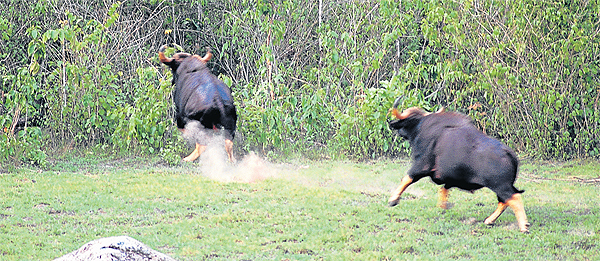About two weeks ago, I hit the jackpot after 48 years in Thai forests. I was alone and it was raining in the Western Forest Complex. I had just set a camera trap at a trailhead where I previously got a big bull gaur, a bull banteng, an elephant, a black leopard, a wild dog, a tapir, a wild pig and a barking deer.

My first encounter with a bull gaur.
As I was walking in to set a few more traps, I spotted some fresh gaur tracks and judging from their size, concluded that they were those of a big mature bull. I went in a little bit more and decided to turn back as the bush was really thick and it was getting late.
I had gone about 50m and all of a sudden, a bull gaur no more than 6m away snorted at me. I snorted back thinking he would run away. In the next moment, this huge beast punched through the bush with its head down in the classic position to hook bad people and throw them into the trees.
I saw the right horn base for a fraction of a second and it took me another fraction of a second to do the only thing possible and that was to drop down to the left and lie flat on my stomach with my head down. The bull jumped over my legs and then circled around to carry on its business of trying to kill me.
For what seemed like a lifetime, I heard him thrashing around breaking saplings and stamping on the ground some 10 to 15m away. A second charge was imminent and could be disastrous if he used his hooves to trample me. Only one thing would save me now.

Gaur bull camera trapped at the trailhead.
I quickly pulled out my pistol, loaded it and let off a shot in the air, all the while still lying down. After the report a few seconds later, the bull high-tailed it, crashing off into the forest behind me. Wow, that was a close encounter and truly a heart-stopper.
I stayed on the ground for quite a while to make sure he was really gone.
In all my years in the forest, I have never been this close to a gaur or had the experience of a charging bull. There was no telling if this old bovid had been shot and wounded previously by poachers, and that he really hated humans. Or was he just an old guy with a bad temper and considered me a threat when I barked back at him. I will never really know how close I came to instant death!
Many a Thai hunter has been killed by gaur because they froze in their tracks and just stood there not reacting in time. I have read in several books that the only way to avert death is to drop down flat with your head down low, or have a very large calibre rifle ready. I had a Nikon D7000 and a 70-300 VR lens.
How did I react so fast and survive? I have one man to thank. He is my dear old friend Gordon Young, author of the book Tracks Of An Intruder, a classic tome about hunting in northern Thailand in the 50s. He talks about the evasive action needed in this urgent situation in a chapter about a man-killer bull gaur in Mae Salak in Chiang Mai. I certainly thought of him right after this. I feel extremely lucky to have survived this attack and it was absolutely the most exciting experience that I have ever had, bar none.
I have been a couple of metres away from a black leopard just outside my blind, and that did not even hold a candle to this charging solitary bull. I certainly did not have time to take a photo.
Maybe being a Taurus had something to do with it, or maybe the "good old spirits" of the Thai forests took care of me and pushed me down at the right moment. This incident surely has me thanking my lucky star.

Gaur cow at a mineral deposit.
Gaur are wild forest ox and the largest bovid in the world standing 1.7m at the shoulder and weighing close to a tonne for mature bulls with a distinctive dorsal ridge and a large dewlap, forming a very powerful appearance. Cows are only about 10cm shorter in height, but are more lightly built and weigh 150kg less. These beasts have stout limbs with white or yellow stockings from the knee to the hoof. The tail is long and the tip is tufted to ward off biting insects. Newborns are a light golden colour, but soon darken to coffee or reddish brown. Old bulls and cows are jet black but south of the Isthmus of Kra, some take on a reddish hue.
All bovine share common features, such as strong defensive horns that never shed on males and females, as well as teeth and four-chambered stomachs adapted to chewing and digesting grass. Their long legs and two-toed feet are designed for fast running and agile leaping to escape predators. They are gregarious animals, staying in herds of six to 20 or more. A large herd of 50 was recorded in Thung Yai Naresuan Wildlife Sanctuary, but that was a long time ago. Due to their formidable size and power, gaur have few natural enemies. Tigers, leopards and Asian wild dog packs occasionally attack unguarded calves or sickly animals, but only the tiger has been reported to kill a full-grown adult. Man, however, is their most dangerous adversary.
These herbivores graze on grass but also eat shrubs, leaves and fallen fruit, and usually feed through the night. They also visit mineral licks to supplement their diet. During the day, they rest in deep shade.
Gaur still survive in some of the best-protected areas in the Kingdom but are in serious decline. It is estimated that maybe a thousand remain in Thailand. In some reserve gaur are breeding in fairly good numbers, allowing them to actually increase populations if there is adequate protection.
These enormous beasts live in herds but also become solitary, primarily the males. I have also seen and photographed several mature females by themselves. Mineral deposits play a very important role in the lives of these wild cattle as do thick forests and steep mountainous terrain with abundant water resources.
Their future depends whether they are protected to the fullest extent. Unfortunately, their beautifully curved horns are highly sought-after by poachers and people who covet trophies.
Bigger budgets, better funding and more rangers and personnel are needed now. Transparency is a must with the national parks and wildlife sanctuaries to ensure that money is used properly and efficiently, and corruption stamped out completely. Now that will be a tough nut to crack.
It is hoped this draconian situation will change, so Thailand's natural heritage and the majestic gaur will continue to survive.
Visit www.brucekekule.com

Pair of gaur bulls on the run.
